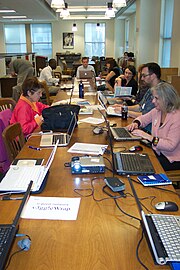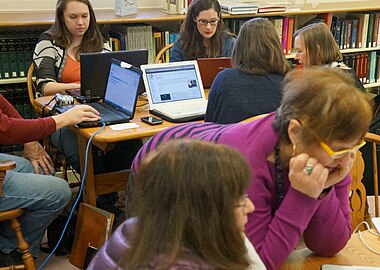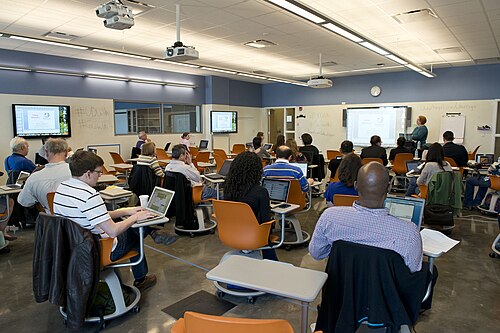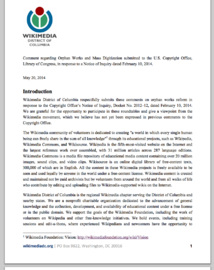Annual Report for Fiscal Year 2013–14
This report describes the activities of Wikimedia District of Columbia during Fiscal Year 2013–14, covering the period from October 2013 through September 2014.
President's message
Programs
At the beginning of the 2013–14 fiscal year, Wikimedia DC realigned its program structure to reflect the three interconnected factors that make the Wikimedia movement a success: content, technology, and community. As described in Wikimedia DC's annual plan:
The aim of Wikimedia DC is to make free content available to the world. The development and promotion of technology gives us tools to distribute free content. Most importantly, building a vibrant community makes all of this possible.
Content
Over the course of the fiscal year, Wikimedia DC supported a total of 21 edit-a-thons in partnership with 13 separate cultural, academic, and professional institutions, including the Smithsonian Institution, the National Archives and Records Administration, the Library of Congress, the University of Delaware, the University of Maryland, George Washington University, the National Museum of Women in the Arts, the Phillips Collection, the Laurel Historical Society, the D.C. Historical Society, the American Statistical Association, the American Chemical Society, and Frederick County Public Libraries. Several of these edit-a-thons were organized with the assistance of Andrew Lih, professor of journalism at American University and longtime Wikipedia editor, who teaches a graduate-level course on Wikipedia and public knowledge.
| Edit-a-Thons by Month | Edit-a-Thons by Partner Institution |
|---|---|
|
1
2
3
4
5
Q1
Q2
Q3
Q4
|
1
2
3
4
5
6
7
8
9
10
Q1
Q2
Q3
Q4
|
| Average Edit-a-Thon Attendance by Month | |
|
5
10
15
20
25
30
Q1
Q2
Q3
Q4
|
The edit-a-thons were attended by a total of 137 volunteer participants, who collectively made 1019 edits to Wikipedia and other Wikimedia projects, adding a total of 290,453 bytes of content. Of these, 276 edits, corresponding to 64,599 bytes of content content, were made by newcomers, while 743 edits, corresponding to 225,854 bytes of added content, were made by experienced editors.
Wikimedia DC additionally held one scan-a-thon with the National Archives and Records Administration, resulting in the digitization of 116 records.
In July, Wikimedia DC launched Wikipedia Summer of Monuments, a three-month-long campaign focused on reaching out to cultural and historical organizations in the Southern United States while encouraging volunteers to upload photographs of historic sites throughout the United States. During the campaign, Wikimedia DC staff met with representatives from the Kentucky Historical Society, the Kentucky Department for Libraries and Archives, the Kentucky Heritage Council, and numerous state officials in North Carolina to encourage the release of photographs under an open license and to help facilitate mass uploads of existing collections.
Over the course of the summer, the Wikipedia Summer of Monuments campaign resulted in the upload of over 10,000 photographs taken by volunteer participants.
Technology
Over the course of the fiscal year, Wikimedia DC supported 3 hack-a-thons in partnership with the Smithsonian Institution, the Sunlight Foundation, and the National Archives and Records Administration. The two Open Government WikiHack events focused on the topic of open government data, including the use of Wikidata as a bridge between open data repositories and Wikipedia entries, such that in the long term, tools could be developed to automatically update Wikipedia articles. Wikimedia DC invited James Forrester to deliver an instructional lecture on Wikidata during the second Open Government WikiHack at the National Archives.
Projects developed during the hack-a-thons included:
- A National Archives authority data tool, including the importation of author ID numbers into Wikidata. With the help of a script, participants were able to import NARA ID numbers into Wikidata en masse, allowing for their use in Wikipedia articles alongside other authority controls such as VIAF. The source code for the script is available on GitHub.
- A Sunlight Foundation API data tool, involving the myriad data repositories made available by the Sunlight Foundation. This data was used for creating entries on Wikidata on sessions of the United States Congress, such as the 112th United States House of Representatives, and helped to improve some Wikipedia articles.
- A tool for comparing disease descriptions, using data from the National Library of Medicine as a source. The idea was developed on the event's HackPad, but technical limitations impeded further development.
Community
Wikimedia DC partnered with Wikimedia New York City to organize the inaugural WikiConference USA. Approximately 250 people from throughout the United States, as well as a handful of Canadians, participated in the three-day event, which featured four keynote speakers and several panels, presentations, and discussions on all manner of topics affecting the Wikimedia community, including the gender gap, paid editing, on-wiki policy and procedure, and offline outreach.
In August, Wikimedia DC hosted its first Workshop Facilitator Training. The event brought together 12 active Wikimedians from across the United States and taught them personalized techniques for executing projects in their existing communities. Early feedback from the attendees was overwhelmingly positive.
Wikimedia DC also hosted several meetups throughout the year, including WikiSalons during the week and dinner meetups on the weekends.
Public policy
During the 2013–14 fiscal year, Wikimedia DC established a Public Policy Committee to present the unique perspectives and needs of Wikimedians to the various government agencies that make decisions on issues affecting the Wikimedia movement. The committee's first initiative was to participate in a roundtable panel on orphan works convened by the US Copyright Office. Wikimedia DC submitted official written comments on legislative proposals to handle these orphan works, marking the first time the organization has offered official advice to a government agency.
In addition, the Public Policy Committee pursued activities related to fostering good relations between the Wikimedia movement and Congress and its staff. Wikimedia DC volunteers met with House and Senate staffers on Capitol Hill for briefings on subjects of mutual interest, including copyright rules and support for making cultural content freely available online. More recently, Wikimedia DC and the Cato Institute hosted a panel on Wikipedia editing for Congressional staff. The event received significant press coverage in light of recent controversies surrounding Congressional editing, and Wikimedia DC later published a blog post supporting Congressional staff making edits to Wikimedia.
Committee members attended a Supreme Court case on software patents, Alice Corp. v. CLS Bank International, and wrote most of the English Wikipedia article on the subject.
Organizational development
Membership
At the end of Fiscal Year 2013–14, Wikimedia DC had 72 members, corresponding to a 18% increase from the beginning of the year.
Governance
During Fiscal Year 2013–14, Wikimedia DC continued to develop its governance practices as a key element of its organizational growth strategy. Over the course of the year, Wikimedia DC adopted several new policies, including an Advisory Committee Policy, an Ethics Policy, a Fiscal Control Policy, a Technology Access Policy, a Travel Policy, a Volunteer Policy, and a Whistleblower Policy, as well as amending a number of existing policy in light of the organization's changing circumstances.
In addition, the Wikimedia DC Board created two new standing committees, the Executive Committee and the Safe Space Committee, as well as four additional advisory committees, the Communications Committee, the Content Programs Committee, the Public Policy Committee, and the Technology Programs Committee.
Grantmaking
Wikimedia DC provides small grants to individuals, community groups, and nonprofit organizations to fund activities aligned with our mission to advance general knowledge and to collect, develop, and disseminate educational content under a free license or in the public domain.
In Fiscal Year 2013–14, Wikimedia DC received six grant applications with a total value of $1,753.72 from individuals and organizations across the United States. Based on these applications, five grants (corresponding to 83.3% of the submitted applications) with a total value of $1,403.72 (corresponding to 80.0% of the total amount requested) were approved and funded. The grants provided by Wikimedia DC were used to fund activities and events in Laurel, Maryland; Boston, Massachusetts; Brooklyn, New York; and Portland, Oregon.
Measures of success
As part of its 2013–14 annual plan, Wikimedia DC identified 11 key metrics and goals for its programs. Over the course of the fiscal year, Wikimedia DC met or exceeded its goals for 9 of these metrics.
Benefactors
Wikimedia DC programs are made possible in part by the generous contributions of our members. Member contributions are collected through a tiered sponsor membership program, which allows members to donate additional funds to support Wikimedia DC activities when establishing or renewing their memberships. Wikimedia DC expresses its sincere gratitude towards these sponsor members for their contributions:
- Gold Sponsors: James Hare, Kirill Lokshin, Peter Meyer, John Sadowski
- Silver Sponsors: Georgina Bath, Vijay Goswami, Christopher Maloney, Elaine Meyer, Diane Shaw, Sarah Stierch
- Bronze Sponsors: Christopher Alhambra, Jim Carpenter, Meghan Ferriter, Peter Hess, Stephen Katsurinis, Christopher Licciardi, Scott Miller, Jake Orlowitz, Nicholas Papacostas, John Rogers, Sage Ross, Misty Sweet, Jacqueline Taylor, Joshua Westgard














